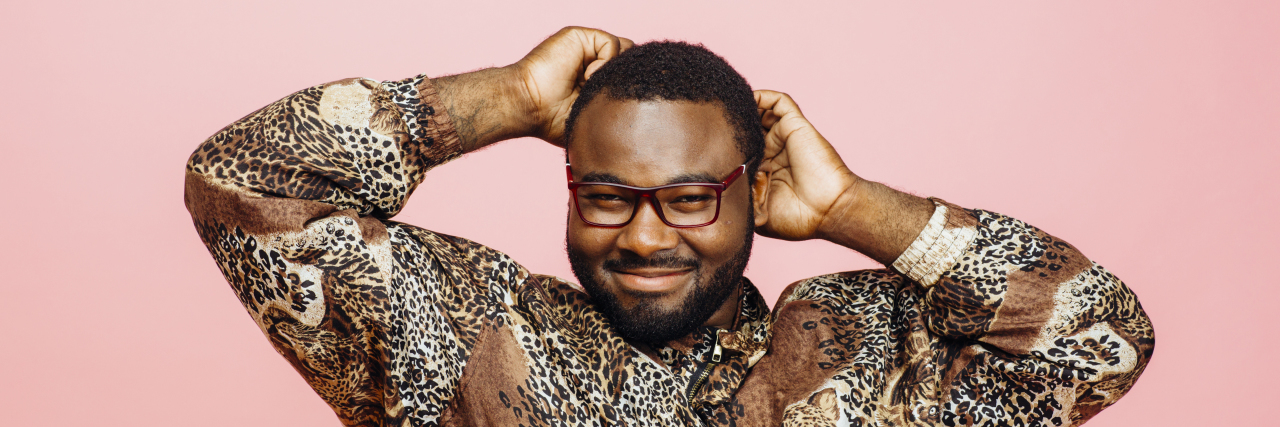Men Need Body Positivity, Too
Editor's Note
If you live with an eating disorder, the following post could be potentially triggering. You can contact the Crisis Text Line by texting “NEDA” to 741741.
Rihanna recently launched a campaign for her fashion line Savage x Fenty and, like anything Rihanna does, it received a lot of attention. However, one aspect that helped the line go viral is the “atypical” models featured. An example is one of the models for her male underwear, later identified as Steven Green, who is considered plus size especially in a fashion industry where impossibly thin frames are over represented, after a viral tweet from a new fan. Men celebrating and identifying with the image were quick to respond.
Never in my adult life have I seen a male model that has a similar body to mine. I feel… almost emotional? Like I finally can buy something I saw and want and KNOW it was made for people like me in mind ????
— Cody Jacob (@codyjacobmusic) October 2, 2020
“Never in my adult life have I seen a male model that has a similar body to mine. I feel… almost emotional? Like I finally can buy something I saw and want and KNOW it was made for people like me in mind” a fan of the line tweeted in recognition of not often having similar body types to his own recognized.
The positive responses to having an often underrepresented or not represented male body type in a high profile campaign all point to an often ignored topic, male body positivity. Where as there is plenty of research and conversation on women’s body image and body positivity, the same isn’t the case for men. Studies on body dysmorphia and negative body images often exclude men from their data sets making the figures harder to track. Yet a study from Bradley University shows that men are impacted by similar issues as women when it comes to negatively viewing their bodies.
Yet even if the issues affecting men and their bodies aren’t commonly discussed, the outside pressure to look a certain way is constant and consistent from TV, movies, magazines and social media. Men are bombarded with what is considered the “desired” height, hair and physique; often with the western ideal of man being svelte with a V shape as the ideal
Take for example the impossible proportions of superheroes on the pages of comic books that have been projected to the silver screen with the multi yearly release of blockbuster comic book inspired films. Stars such as Chris Hemsworth (Thor), Hugh Jackman (Wolverine) and Ryan Reynolds (Deadpool) have gone through incredibly regimented diets and exercise programs to pack on muscle for their roles with personal trainers and nutritionists. The onlooker on the other hand just sees the end result. Magazines such as Men’s Health often run articles on how to mimic these looks such as their “superhero shred.” What doesn’t come with the subscription is the studio paid personal trainer and nutritionists and hours of dedicated time to a professionally designed regiment.
Robert Pattinson, cast as the titular character in the upcoming “The Batman,” addressed the expectations in these films. “I think if you’re working out all the time, you’re part of the problem, you set a precedent. No one was doing this in the ’70s. Even James Dean -0 he wasn’t exactly ripped,” said Pattinson in a GQ interview discussing his role.
As men try to achieve an aesthetic that is difficult or impossible, many have turned to surgery for help getting the look they want. The male cosmetic surgery industry has grown over 300% since 2007 according to a study published in 2015 by the American Society for Aesthetic Plastic Surgery. ASAPS also shows that the top surgeries for men and women are the same.
Men with a negative body image that desperately want to change their look without going under the scalpel may result to more dangerous approaches such as extreme diet bulimia and other eating disorders, extreme dieting and extreme exercise. Poor body image can also cause low self-esteem and depression and similar to other mental health issues in men, the symptoms of poor body image may not be easily diagnosed because of long standing ideas of masculinity that make it difficult for a lot of men to open up and discuss vulnerable topics.
Fortunately, there is a headwind of change.
Inclusivity in fashion shows and ads is a growing topic and body positive campaigns, such as that of Rihanna, may help push the industry towards new ideas of what is featured and promoted in their content. More importantly, men can take steps to promote a healthy body image of themselves and others by following some practices that promote body positivity. These include: being more concerned with health than physique, not comparing themselves to others and not allowing others to make comments on their body and vice-versa.
Men would be wise to get on board and actively promote body positively, combating the negative impact media may have on self-image. Nothing is wrong with wanting to improve health and fitness when approached in a healthy way, but the pursuit of the “ideal” body should be based on personal goals and not made up guidelines pushed by social media influencers and articles based on shoddy science. Ultimately, we may all be a lot happier if we learn to accept the body we’re in.
Image courtesy of Getty Images.

